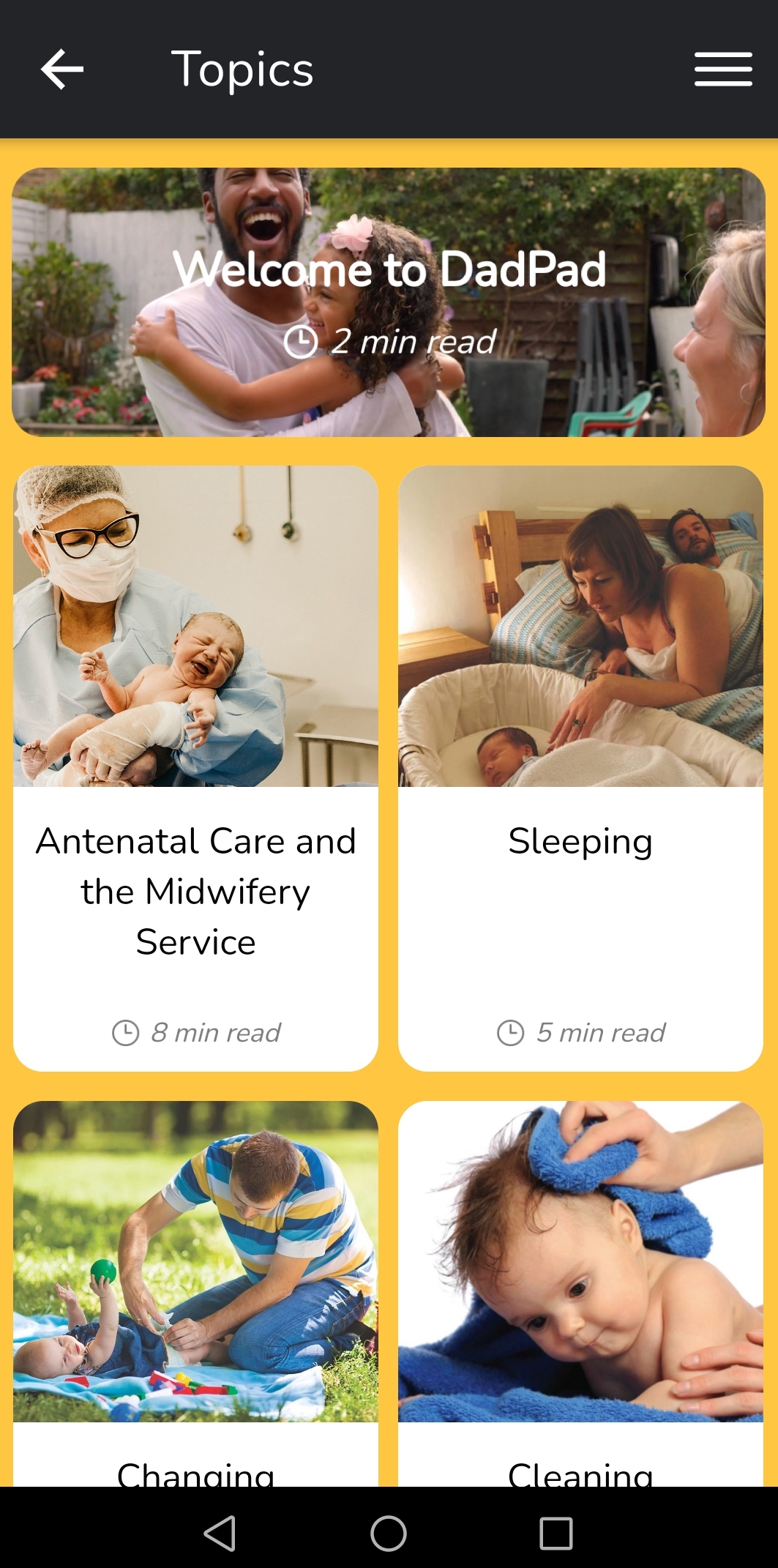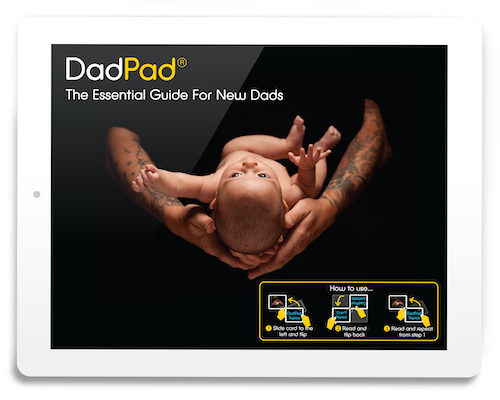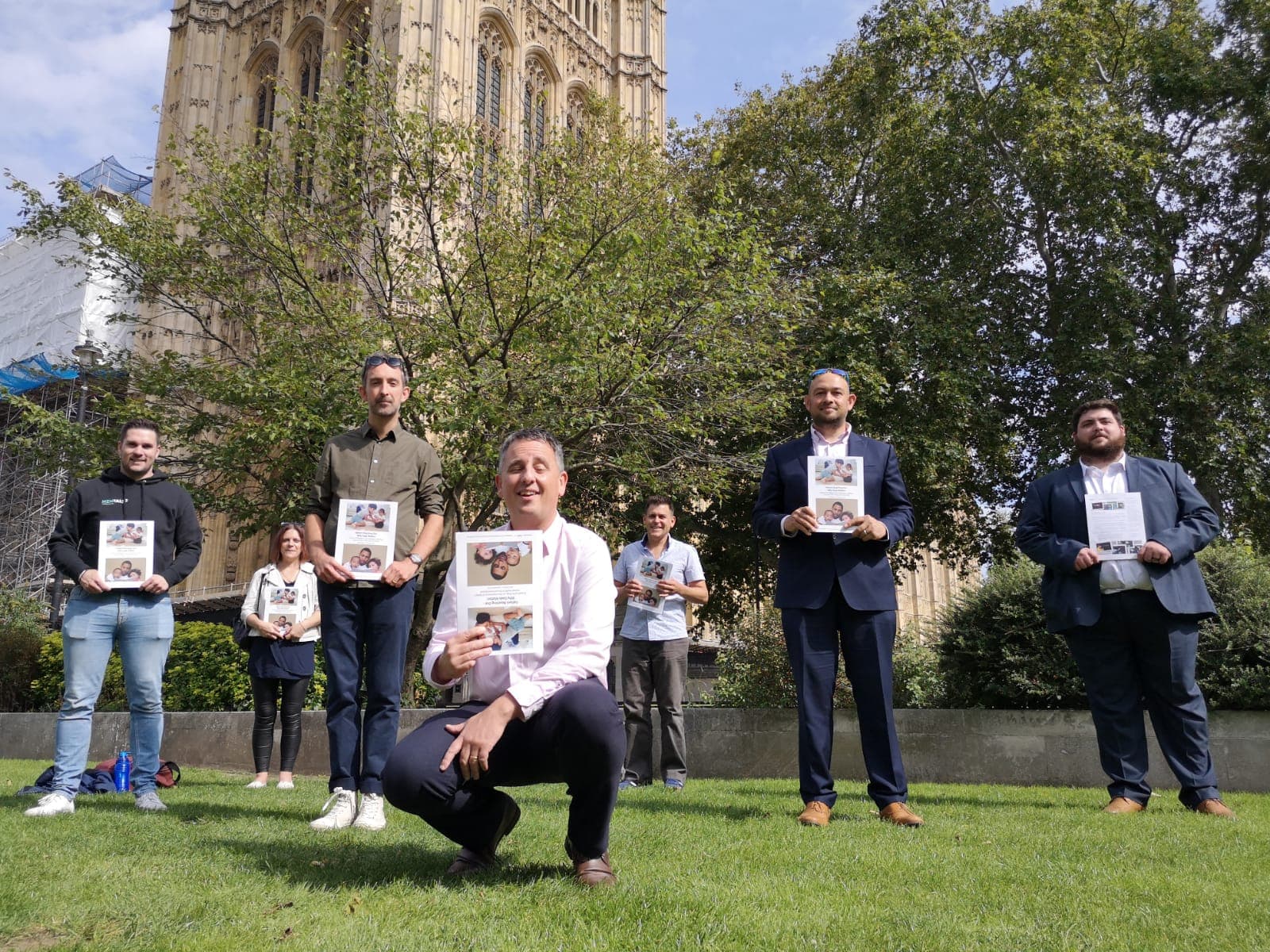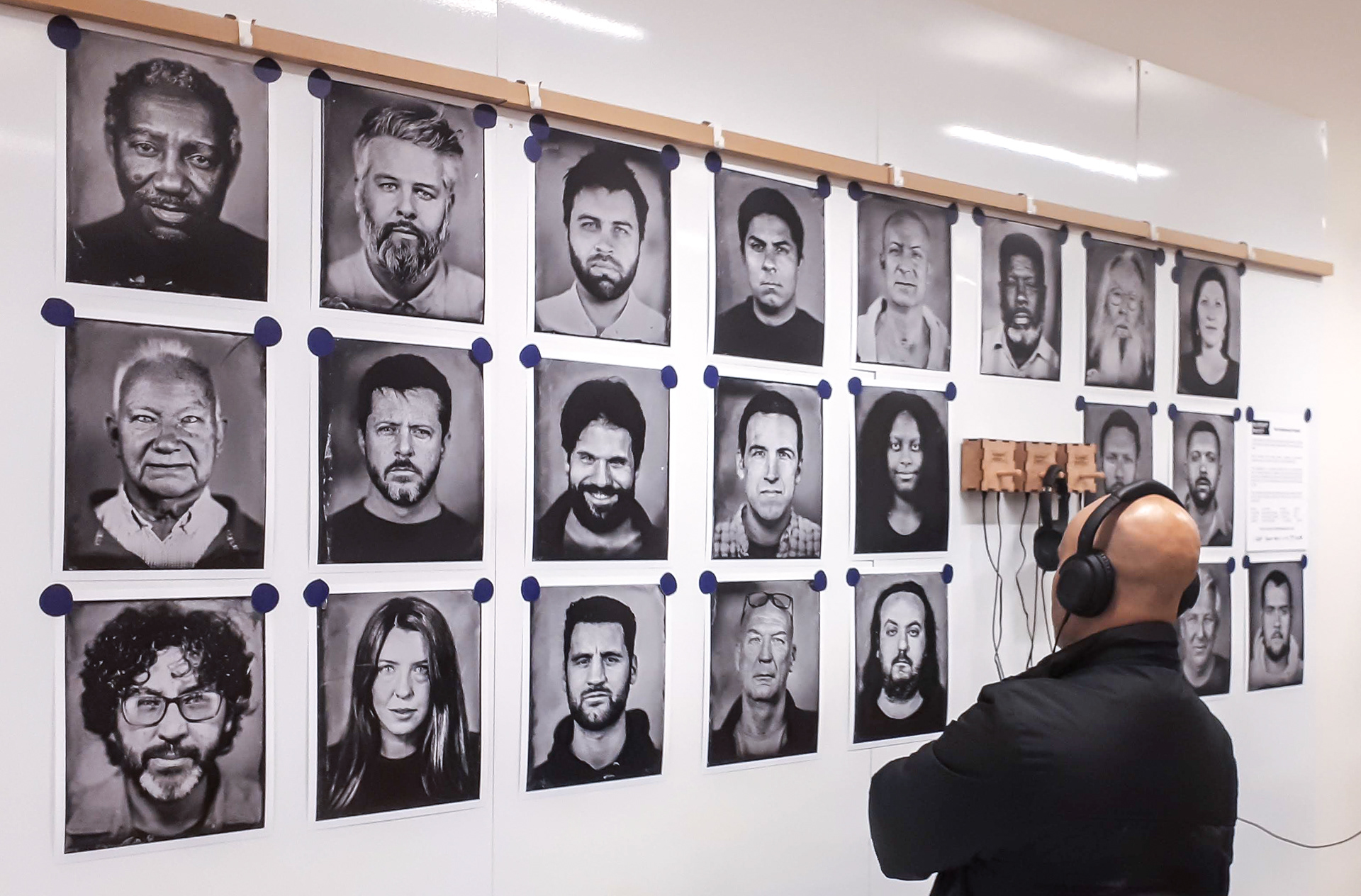
Why DadPad?
By Hannah Bose | 18th February, 2022 | 23 minutes read
We thought it might be helpful for us to pull together a blog post setting out some of the reasons why – as a Health Trust or local authority provider – you might want to invest in DadPad…
What is DadPad?
Developed with the NHS, the DadPad gives new dads and dads-to-be the knowledge and practical skills necessary to support themselves and their partner, so that babies get the best possible start in life.
Topics covered within the DadPad itself include:
- An overview of the Health Visitor Team and the appointments that parents will have;
- ‘Baby basics’, including feeding, sleeping, holding, coping with crying, cleaning and bathing baby and changing nappies;
- Ways in which dad can help to build his bond with his baby, including baby massage, communicating, baby swimming, and play and learning;
- Core information on perinatal mental health for dad – what to look out for in his partner, and what to look out for in himself, as well as advice on supporting each other and their relationship; and
- An overview of other key topics, including child development, legal information and important further sources of parenting advice and support.

In addition to the above, the DadPad app also includes:
- Enhanced core content, covering areas such as the Midwifery Service and antenatal appointments, the fourth trimester, healthy pregnancy and healthy family, and home safety;
- Information on and contact details for local hospitals, health visitor teams and perinatal mental health support; and
- Specialised content on local services, charities and support groups on a range of topics relevant to expectant parents and new parents.
First launched in Cornwall in 2012, the DadPad has been kept under continual review, to ensure that all content is up-to-date, reflective of current best practice and contains all the information that new dads and dads-to-be want to know.
Over the intervening decade, DadPad has grown and – as at February 2022 – the app is now available in 24 NHS Trust areas across the UK, with more preparing to launch during the year.
How does DadPad differ from other parenting guides, apps and websites?
Obviously, the market for information and advice for new parents is a busy and competitive one, but we believe that DadPad has a unique offer to make, for the following reasons:
- Since Day One, DadPad has been specifically written for dads, on the topics that dads and health professionals told us that they wanted and needed to know about, with expert input from NHS and Public Health professionals. As mentioned above, it’s kept under regular review by the same individuals, so you always be sure that DadPad offers the latest, most up-to-date information and guidance as to best practice;
- We’re totally focused on ‘getting the language right’, so that dads feel engaged and included. Unlike other guides, supposedly written for ‘parents’, you won’t find DadPad inadvertently slipping in phrases like ‘when you give birth’ or ‘when you are breastfeeding’. This is because all the research evidence tells us that – for dads to actively engage in parent-focused material – they need to feel that it hasn’t actually been intended for mums, partly because many dads feel that pregnancy, birth and the whole perinatal period is an exclusively female arena, in which they shouldn’t/don’t want to get involved, and partly because they are afraid of taking the attention or focus away from the mum at such an important time in her life. Writing materials for dads, in dad-focused wording at all times, is key to overcoming this, and helping dads feel welcomed and valued as a co-parent. Further, our years of experience in this area also enables us to spot, challenge and alter wording which might perpetuate outdated stereotypes regarding the various roles of each parent in relation to their child – for example, we’ll try and avoid phrases like dad “helping to care for the baby”, which might suggest that mum should be taking the lead… It might seem silly, and pedantic, but it’s all about challenging unhelpful conventions; after all, have you ever seen mums being encouraged to “help to care for baby”?
One of the points we stress in our work is the importance of actively using the ‘F’ word (father) in any letters, posters, papers, briefings, tender documents or other communications you produce. Unless you explicitly address fathers, they are overlooked and implicitly excluded: most people (mothers and fathers, practitioners, policymakers, researchers, etc) see the word ‘parents’ and read it (consciously or subconsciously) as meaning ‘mothers’.
Jeszemma Garratt, Head of Training at The Fatherhood Institute
- It’s not – and never will be – a gender-neutral, all-things-to-everyone ‘ParentPad’. This isn’t because we’re not mindful of other parent demographics, but because we believe – and, again, this is based on research findings – that, to do the job properly, dads require something that is exclusively for them and their specific needs. Men’s and dad’s mental health needs will be different to those of other co-parents, the co-parent relationship dynamics between a man and a woman will differ from that between other genders, and so on. And because we’re so passionate about (a) ensuring that all parents receive the advice, information and support that they need and (b) writing materials that are specific for the needs and wants of each parent demographic, we have a brand-new resource – the Co-ParentPad – coming out later in 2022, which has been written specifically for LGBTQI+ non-birthing parents;
- The DadPad has more intended purposes than being ‘just’ a guide book or resource to help dad find out more about the skills that he needs to be a hands-on father; it’s also designed to be used by relevant health professionals as an embedded engagement tool, as part of their whole family approach to perinatal care, including as:
- A means of engaging with/building a relationship between dad and health professional, so that dad knows that he can: trust the health professional; be honest with them about his fears, emotions and worries; confidently share any concerns that he may have relating to mum and/or their baby at the earliest stage; and encourage mum to do the same – all of which will help to give baby the best start in life;
- A means by which health professionals can start to build a picture regarding any potential safeguarding concerns – how, for example, does dad react when the DadPad is shared with or mentioned to him? (we’ve got a further, more detailed article on the use of DadPad as part of a safeguarding toolkit coming out later this month); and
- An empowerment tool for dads, especially the less confident, younger and/or more vulnerable new fathers, helping them to see that they – just like mum – are valued, relevant and an essential part in, not only their new baby’s life, but also the whole perinatal period, from pregnancy, through to labour, birth and beyond.

Why isn’t the app free?
Obviously, there are a number of purportedly parent-focused resources available online at no cost, so you might wonder why we charge a fee for the DadPad app. There are several reasons why we choose to charge for our products, including:
- We value our product, and we believe that – by putting a price on it – we help others to value it, too.
- We value our staff and want to be able to pay them an appropriate wage in order to reflect their collective expertise and experience. Across the current crew of full-time, part-time and freelance team members, we’ve got a range of degrees – at both Bachelors and Masters levels – in topics as diverse as Psychology, Law, Marketing, Education and even Silversmithing, together with a huge amount of personal, lived, employed and voluntary experience in a whole range of areas which are relevant to the various aspects of DadPad, including:
- employment within the Probation Service, as a group facilitator, with detailed experience of working with men on cognitive change programmes, including in particular working with domestic violence offenders;
- employment within further and higher education as a lecturer;
- working as a freelance writer, editor, examiner and author of materials relating to education, professional qualifications and the law;
- working as a regional and national trainer on cognitive change programmes;
- writing and leading a course for new fathers used in Children’s Centres for five years across the south-west, and co-writing a Young Fathers’ Course for roll-out across a national organisaiton;
- employment as a soldier in the British Army, including having been a ‘military dad’;
- working as a birth and postnatal doula, who’s also worked as a Traumatic Birth Recovery practitioner, and local breastfeeding peer support volunteer;
- having been the founding Chair of a Maternity Voices Partnership, with in-depth experience of working with and advocating for vulnerable and marginalised families in rural communities – with her work alongside the local hospital to engage the local Roma, Gypsy and Traveller communities recognised as an outstanding example of practice by the CQC in 2020 and Highly Commended for the Maternity Voices Award at the 2019 International Maternity Expo;
- previous membership of the local Perinatal Mental Health Board;
- previous service as a primary school governor and current service as a governor at a nursery school;
- as a founder member of the Paternal Mental Health Alliance;
- as a member of the Birthrights Expert Panel for the Human Rights Inquiry into Racial Injustice in Maternity Care;
- as a supporter of the NHS England’s Better Births Continuity of Carer Expert Reference Group; and
- of course, lived experience as parents! Between the team – currently two dads and two mums – we’ve got seven children, ranging in age from 16 years to just a few months.
- We’re a Community Interest Company, which is a company that – at its heart – operates to serve a social purpose. We formed to help reduce inequalities, with a focus on helping society’s most vulnerable – babies – by working to engage, include and support fathers as they transition to fatherhood. Crucially, it also means that we are a business that operates on a profit-for-purpose basis, so we are bound by rules to ensure that our profits are spent on furthering the social purpose of the company and we cannot pay ourselves over and above what would be fair and equitable in relation to the same roles in another organisation or in relation to our levels of experience and qualifications. These pay ‘caps’ are set by Companies House regulations, and we do not have shareholders that we have to pay dividends to. It’s great to be focused!
- So, by receiving income as a result of selling our products, we have been able to continue to invest in dads and parents, and to keep expanding, growing and improving our offer. Over the last ten years, we’ve used DadPad income to:
- Continually keep all DadPad content under review, arranging for redesigns, rewrites and reprints when changes have been required as a result of changed advice on best practice;
- Develop our DadPad app as a separate innovation alongside the existing and original hard copy DadPad book, in response to demand from healthcare professionals for an online, accessible-on-the-go resource;
- Develop, write, print and produce the DadPad Neonatal (DPNN), a version of the DadPad written for the specific needs of new dads who find their babies in a Neonatal Unit after birth, in response to a request from consultant neonatologist Professor Minesh Khashu at Poole Hospital to meet this previously unmet need – and we’ve been delighted to have had the DPNN Highly Commended by the BMA in the Innovation Category of their Patient Information Awards in 2019;
- Develop a Quick Read ‘baby basics’ version of the original DadPad. Conceived with the help of an ‘easy read’ expert and designer to provide enhanced illustrations and simpler, more concise explanations of key points of knowledge and skills, this book is now being used by NHS Trusts alongside existing DadPad products to enable them to reach out to and engage with a wider-ranging group of dads, including in particular those who would – for whatever reason – struggle to read and cope with the detailed explanations contained in the original DadPad;
- Translate core DadPad app content into a range of different languages. By purposely avoiding using automated translation software and instead investing in bespoke translation services, we are aiming to ensure that the other language versions are – like all existing DadPad content – the best quality that they can possibly be, again enabling Health Trusts to feel confident using our products and to reach out to and successfully engage with an even larger number of dads-to-be and new dads in their area;
- Continue to innovate to ensure that DadPad and the DadPad app remain the best that they can possibly be, reacting to feedback from users and Trust areas as to what other elements they would like to see and be able to offer. The updated version of the app, with a whole host of exciting new features, is coming out later this year; and
- Developing new versions of the DadPad to offer support to as many new parents as possible. New issues planned for release in 2022 include the Co-Parent Pad, for LGBTQI+ non-birthing parents, and a MumPad, which focuses on improving the mum/dad relationship during the perinatal period, with key pointers on things that dad would want mum to know and/or discuss with him. We’re also continuing to work with our contacts in the services to consider how best to offer support to military dads and their families.
And, in the overall scheme of things, DadPad is a relatively low-level investment for a Health Trust to make, given the potential long-term savings that the SROI tool (see further, below) has suggested it could make.

But does it actually work?
We’re obviously regularly asked what evidence there is to support DadPad and the goals we intend it to help meet. Hopefully, some of the points below will help address such queries:
- With any new and innovative approach to a social problem which involves system change and with prevention at its core, it will take time to understand all the benefits and be able to measure them, so as to adjudge the true impact and effectiveness of that approach. Having said this, though, there are still ways to accurately see impact – in both social and economic senses – which again require effort and change to implement. This includes surveys, focus groups and data analysis tools which consider direct effects and cost savings (in terms of pounds and pence) for society as a whole.
- One tool used to measure the economic return on investment made is the Social Value Engine Tool which, when initially applied to the use of DadPad in its early years, came back with a figure which indicated that – for every £1 spent on DadPad – a £56 saving could be made to the community. An example of how this happens is that, by using his DadPad, a dad would be able to notice symptoms of depression in his partner during pregnancy much earlier than he might otherwise have done, had he been unaware of the signs to look out for. Again, as a result of the advice set out in DadPad, he will be able to ensure that she receives correct support and treatment at an earlier stage, and will also potentially need less interventions. There are therefore implicit cost savings as a result of less treatment (and possibly also less severe treatment and/or interventions), not only in financial terms, but also in relation to the potential impact on that a prolonged, undiagnosed and unsupported period of mental ill health might have had on the family as a whole. This is just one example of how an approach to the perinatal period which includes, informs and engages dads and partners can be so effective in preventing negative health and promoting shared care and partnership in newly-formed families.
- Our entire ‘back catalogue’ of content and approach is evidence-based, guided by over 20 years of research into the importance of father and partner inclusion and focused on the best ways to care for babies and their families. All this research has, of course, most recently dovetailed with maternity services approaches which encourage their workforce and initiatives to be inclusive and equitable, and to ‘Think Family’, to look at the world through the baby’s eyes and to be trauma-informed. As mentioned above, this research has established that there is a clear need for dads to receive a direct approach and to be spoken to directly in relation to all things perinatal and parenting, in order to feel included and engaged. Although this whole issue is covered in more detail in other blogs (including our “Why dads?” piece), some of the key points – all of which are central to all DadPad work and innovation – are that:
- Academics, such as Dr Anna Machin, have established that dads have a unique and important role to play in his child’s life, with his bond helping his child to not only feel loved and nurtured, but also to learn how to deal with challenges and gain in confidence;
- The Government – via reports such as Every Child Matters in 2003 – are advocating for the need for greater recognition of and support for the role that fathers play in a family;
- Research has established, though, that fathers feel excluded during the antenatal period, and also that perinatal services have not been focused on the perinatal mental health struggles of fathers/partners;
- Some of the reasons for these feelings of exclusion (as summarised by Raquib Ibrahim from Mellow Parenting at the 2020 AIMH Annual Infancy Conference) – barriers to engagement, if you like – include:
- cultural expectations (e.g. in relation to perceived gender roles within a family);
- ingrained societal attitudes regarding dad’s role (use of phrases like ‘baby-sitting the kids’);
- environmental constraints (including expectations and availability of access in schools, services, family centres etc);
- accessibility, which also links to work commitments (are there any groups or services available for dad and, if there are, are they available at times when he can easily access them?);
- family circumstances (such as the dynamics in his relationship with his partner, his in-laws, etc);
- resources (where are these being targeted, what funding is available to support dad-work, and what knowledge, expertise and awareness do staff have to involve and support dad?); and
- images and language (such as in social media and across the internet).
- And this latter point leads into that confirmed by many academics, including Jeszemma from The Fatherhood Institute (quoted above), that dad-focused materials need to be explicitly written for dads for them to actively engage with the resources. Using words like ‘parent’ will implicitly lead dad to believe that they are for mum, not him, and he will actively disengage.
- We are so pleased to have received so much positive feedback from dads, families and health professionals over our years of operation. These comments have meant that – during the past three years – we have (so far) been commissioned by over 24 perinatal organisations (including NHS maternity and clinical Perinatal Mental Health Services, Public Health and Safeguarding Boards), making our DadPads and DadPad app available to new dads in about 75% of the UK. Further, the fact that we have also received repeat orders from established DadPad areas (either for additional books and/or for renewal of app licences) further evidences the fact that commissioners are happy with the benefits that DadPad provides to them, their teams and their families;
- As a result of learning gained from all the feedback that we have received over the years, we are about to refresh our DadPad app with many new and exciting features. Working alongside the Academic Health Science Network (AHSN), we will not only be embedding tools to gather evidence for a long-term evaluation, but we will also be building a community of support by and for the dad-users. This will also enable them to provide feedback into other organisations that want to learn how to best support them as new dads, but also to be linked up with university or other research studies looking to gather dad-focused evidence.
 Julian with Mark Williams and team, presenting Mark Williams’ report to the House of Commons and NICE in Sept 2020.
Julian with Mark Williams and team, presenting Mark Williams’ report to the House of Commons and NICE in Sept 2020.
What else does ‘DadPad’ do?
As you’ve hopefully guessed by now, the team at DadPad are a lot more than simply producers of a guide for new dads. As well as Julian being one of the founder members of the Paternal Mental Health Alliance, an organisation established in September 2020 following the presentation of the ten-year report by fathers’ mental health campaigner Mark Williams and team to NICE (the National Institute of Clinical Excellence) and to MPs in Parliament, we also work to raise the profile of dads’ mental health needs and dads’ role as a co-parent via our social media accounts and blog posts.
We’ve established ourselves as a recognised source of information and expertise via our growing list of contacts – e.g. via dads and health professionals within our 24 (and growing) DadPad areas, as well as our ‘dadvocate’ contacts, engaged in dad-work and/or research across the UK. The latter includes the aforementioned Mark Williams, Kieran Anders at Dad Matters UK, Dr Andy Mayers from Bournemouth University, Jeszemma Howl at The Fatherhood Institute, Errol Murray at Leeds Dads, perinatal mental health support advocate and trainer Scott Mair, and Ash Curry, a perinatal mental health trainer with expertise in OCD. We’re constantly looking to reach out to more and more such workers and campaigners, to continue to ‘keep the dots joined up’ regarding dads’ work across the UK.
This has all also enabled us to become something of a ‘listening bank’; we’re trying to listen to the voices of both dads and workers on the ground, via all our DadPad areas, to reflect on the changes that are needed in real-time. This gives opportunities for the researchers, organisations and statutory services around us to understand and learn what the dads and their families need in terms of existing support, and the new levels and types of support that would need to be created.
Becoming recognised as experts in our field means that we’re also increasingly asked to become involved in new and evolving projects, research, strategies, systems and processes around dad-work, which is fantastic and an honour to be invited to do.
We do our best to keep on top of all the latest research and evidence coming out around topics applicable to our work, including dads, parenting, the perinatal period and other co-parents. To this end, we also endeavour to support students and researchers undertaking research within relevant areas, including by sharing their requests for participants across our social media channels.
This constant reading and searching for the latest developments in our field also supports Team DadPad in providing ‘added value’ on all aspects of parenting and being a dad via our regular blog posts, usually published each Friday as part of our #FatherhoodFriday initiative on social media. These blogs provide further reading for dads and/or health professionals on a range of core topics including:
- dads’ mental health;
- infant mental health;
- bonding and attachment;
- safe sleep;
- coping with crying;
- and the basics of baby care.
We always work hard and do our utmost to ensure that these articles are accurate, referenced and – where relevant – written in a way that makes them accessible to dads (and our team’s collective experiences in academia, freelance writing and related services means that we believe that we’re able to do this to a high standard, again ensuring that all our content is reliable, professional and can be trusted).
It is always a privilege to work with so many perinatal professionals who help us to share the results of our many content collaborations between areas, ensuring that all new dads are benefitting from the best and most up-to-date information, and which crucially has saved a great deal of time for these professionals who are no longer having to ‘reinvent the wheel’.
We’re also dedicated to helping organisations and health teams ‘get the language right’ around dads, as mentioned above, and we have further invested our profits to encourage and enable other charities and ‘dadvocates’ to develop their own projects. For example, over the past couple of years we have:
- worked with Mark Williams to help him share his message by:
- sponsoring the production of the book of his life story – Daddy Blues – into a film, and
- working with him to compile, edit and publish his ground-breaking ten-year report, which we also sponsored in full;
- sponsored Alright Mate? CIC‘s Cally Hayes’ production of an audio series to help new dads hear about how mental health is affected when transitioning to fatherhood.
 Alright Mate? CIC’s fatherhood installation: Fatherhood and Mental Health
Alright Mate? CIC’s fatherhood installation: Fatherhood and Mental Health
In addition to all of this – and even though we’re not set up to provide direct advice to individuals – we also do our best to offer ad hoc support and/or ideas for referrals or signposting to the health pros, families and individual dads who contact us.
Finally, our mission is to enable dads’ (and partners’) voices to be heard: for those surrounding them to know what they need and how to fully support them as they transition to parenthood. We aim to do this on a daily basis, as we speak with dads, with our ‘dadvocate’ contacts, with frontline health professionals, with commissioners and even – occasionally – with politicians and the media. Our new app platform will further help us to ‘hear’ from those dads, and to share their message wide and far.
The ideal solution?
So imagine, then, if every new dad is given access to the DadPad app (and/or a copy of the DadPad) as he leaves his first contact with a perinatal professional… Immediately, some of the key established barriers to ‘dad-engagement’ are being broken down. As he begins and continues to engage with the DadPad content, specifically written for his needs, he will not only be gaining in key knowledge and skills, which will enable him to become a supportive and involved co-parent and father, but will also be being encouraged to engage and build a relationship of trust with the healthcare professionals surrounding him and his family. This will give him the confidence to seek out answers to the important questions that he has, and to raise his worries without fear, in order to get the best support possible. At the same time, the healthcare professionals will be gaining a fuller and more true picture of the family dynamic, equipping them to give that new unit the utmost in tailor-made support and continuity of care, all of which will give baby the very best opportunity for the best start in life.
Perinatal services therefore need to play their part in the engagement process, too, and working in collaboration with us at DadPad – gaining from our collective expertise and experience (both internally, from within our team, and externally, from our links with other areas and professionals across the country) and ‘listening bank’ insight from dads, dad-workers and healthcare professionals – is at the very heart of our offer, growing and learning together with you to better support dads and partners, which we have all wanted to do for so long.
To find out more about DadPad and how it could work for you, in your area, please get in touch with us for a no-pressure, exploratory chat: hello@thedadpad.co.uk.

